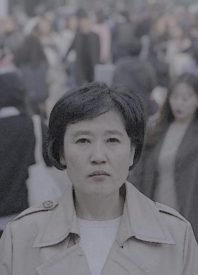
Kim Ryon-hui likes to observe, something that she does even when she’s with other people. She’s just like everybody this way. She also observes a country that’s alien to her. Her story’s unique. Against her will, a broker smuggled her from North Korea to the South. During Shadow Flowers‘ timeline, she juggles her work in the recycling plant with conferences. She pleads for public support so that she can finally go home to her family.
Shadow Flowers also takes time to depict the mental struggles of her daughter, taking English classes in North Korea so that she can take a restaurant job. The camera tries to observe her as she participates in class to sharpen her conversation skills. Through the shots of her school and Pyongyang, the film makes it look like that city isn’t so bad. But that seems irrelevant to a young woman living without her mother.
Shadow Flowers is probably technically my first North Korean film, but the novelty of seeing a country for the first time occasionally wears off. Those scenes don’t do a lot to explore the interiority of these subjects. They only exist to show that Kim does have people to return to and that her memories of North Korea matches with reality. Clocking in at almost 110 minutes, some of the scenes here also need a good trim.
But there’s enough material here of Kim, feeling the mental effects of the bureaucracy that’s stopping her from crossing back home. Many of Shadow Flowers‘ scenes show her different reactions towards government workers. They tell her to go to one agency or embassy to the next. Both parties know what her end goal is. Sometimes, she smiles like her daughter, showing the pressures she faces to be ‘normal’ in a political system that’s destroying her.
- Release Date: 10/18/2020

